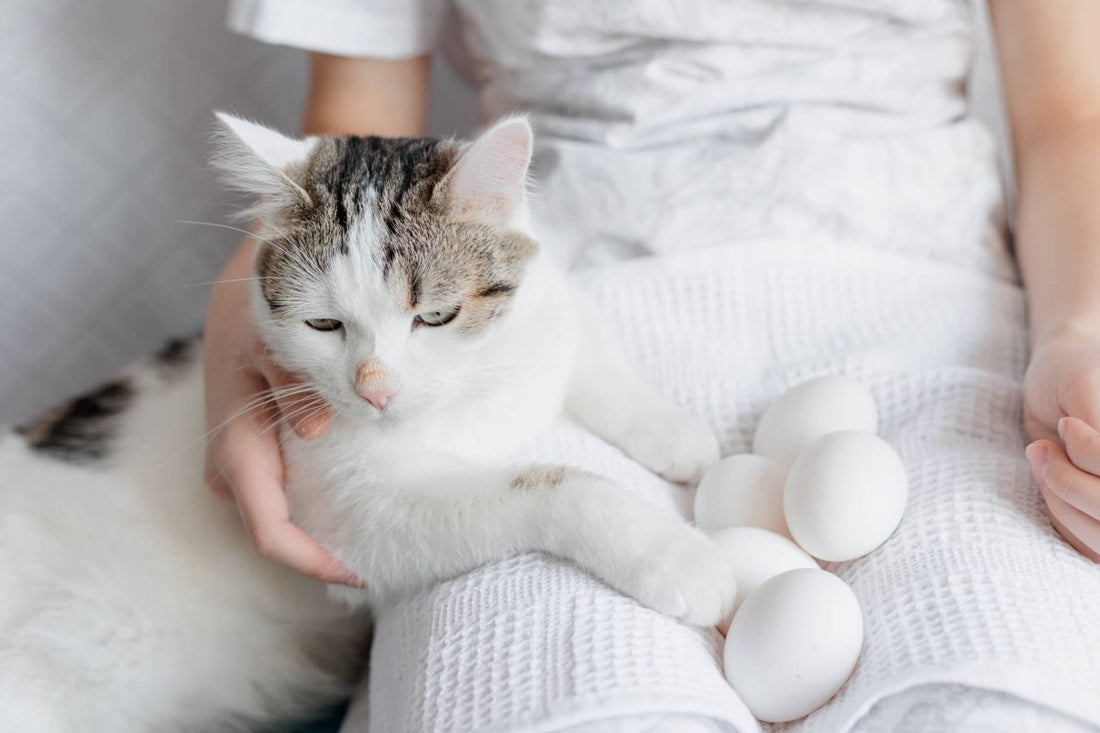Eggs for cats: healthy snack or risky treat?
Eggs are an essential part of the human diet—but what about our furry friends? Can cats eat eggs? The answer is yes, but only under certain conditions. Eggs can be a valuable source of protein and a healthy addition to your cat's diet. In this blog, you'll learn all about the benefits, risks, and proper feeding of eggs to cats.
Can cats eat eggs? The short answer
Yes, cats can eat eggs if they are properly prepared. Boiled or lightly fried eggs are a safe and healthy choice. Raw eggs, however, pose health risks and should be avoided.
What is allowed?
- Boiled eggs (hard or soft).
- Lightly fried eggs without spices.
What is forbidden?
- Raw eggs (because of salmonella and avidin).
- Eggs with salt, pepper or other spices.
The benefits of eggs for cats
Eggs are not only delicious, but also rich in important nutrients that can benefit your cat. Here are the key benefits:
1. High-quality protein
- Eggs contain high-quality protein, which strengthens muscles and promotes regeneration.
2. Vitamins
- Vitamin A: Supports vision and the immune system.
- Vitamin D: Promotes healthy bones and teeth.
- B vitamins: Important for energy metabolism.
3. Healthy fats
- Eggs contain healthy fats that ensure a shiny coat and healthy skin.
4. Minerals
- Selenium: Has an antioxidant effect and supports the immune system.
- Iron: Promotes the formation of red blood cells.
5. Low in calories
- Eggs are relatively low in calories and are therefore suitable for overweight cats in small quantities.
How many eggs can cats eat?
The right amount is crucial to reap the benefits of eggs without overfeeding your cat.
Recommended amount:
- Small cats: 1/4 egg per week.
- Medium-sized cats: 1/2 egg per week.
- Large cats: Up to 1 egg per week.
Risks and precautions for eggs
Although eggs can be healthy, there are some risks you should be aware of:
1. Raw eggs and salmonella
- Raw eggs can contain salmonella, which can cause serious gastrointestinal problems in cats.
2. Avidin
- The protein avidin in raw egg whites inhibits the absorption of biotin, an important B vitamin.
3. Spices and additives
- Spices such as salt and pepper as well as butter or oil are unsuitable for cats and can cause health problems.
4. Allergies
- Some cats may be allergic to eggs. Watch for symptoms such as vomiting, diarrhea, or skin rashes.
5. Overfeeding
- Too many eggs can lead to digestive problems or obesity.
How do you properly feed eggs to your cat?
Proper preparation is crucial to ensure eggs are healthy and safe for your cat. Here are some tips:
1. Boil eggs
- Cook the egg until the white is firm and the yolk is completely cooked.
2. Serve without the shell
- Remove the eggshell, as it is difficult to digest and can cause injury.
3. Cut into small pieces
- Cut the egg into bite-sized pieces so your cat can eat it easily.
4. No spices
- Feed the egg pure, without salt, pepper or other additives.
5. Insert slowly
- Start with a small amount and see how your cat reacts.
Creative ways to prepare eggs for cats
Eggs don't have to be boring. Here are some creative ideas for offering them to your cat:
1. Boiled egg as a snack
- Cut a boiled egg into small pieces and serve it as a snack.
2. Mix egg into the main food
- Mix a small piece of boiled egg into your cat's wet food.
3. Homemade cat snacks
- Combine boiled egg with some tuna and form small balls.
4. Egg Omelette
- Make an omelet with an egg and some cooked chicken or vegetables (e.g. carrots) – without any spices, of course.
When should you not give your cat eggs?
In some cases, eggs are not suitable for cats:
1. Allergies
- If your cat is allergic to eggs, you should avoid them.
2. Sensitive stomach
- Cats with sensitive digestive systems may react to eggs with diarrhea or vomiting.
3. Special diets
- If your cat requires a special diet, you should only feed eggs after consulting your veterinarian.
Frequently asked questions about eggs for cats
“Can kittens eat eggs?”
Yes, but only in very small quantities and always cooked.
“Is raw egg dangerous for cats?”
Yes, raw eggs carry the risk of salmonella and contain avidin, which inhibits biotin absorption.
“Can cats eat eggshells?”
Eggshells contain calcium, but should only be ground and fed in small quantities.
“What alternatives are there to eggs?”
Chicken, fish or wet food with a high protein content are good alternatives.
Conclusion: Eggs for cats – healthy, but in moderation
Eggs can be a healthy and delicious addition to your cat's diet when prepared properly and fed in small amounts. Key points at a glance:
- Safe: Only boiled eggs without shells and spices.
- Benefits: High-quality protein, vitamins and healthy fats.
- Caution: No raw eggs, spices or excessive amounts.
With these tips, you can safely and confidently offer eggs to your cat. Not only are they healthy, but they're also a varied treat that your cat will love!



